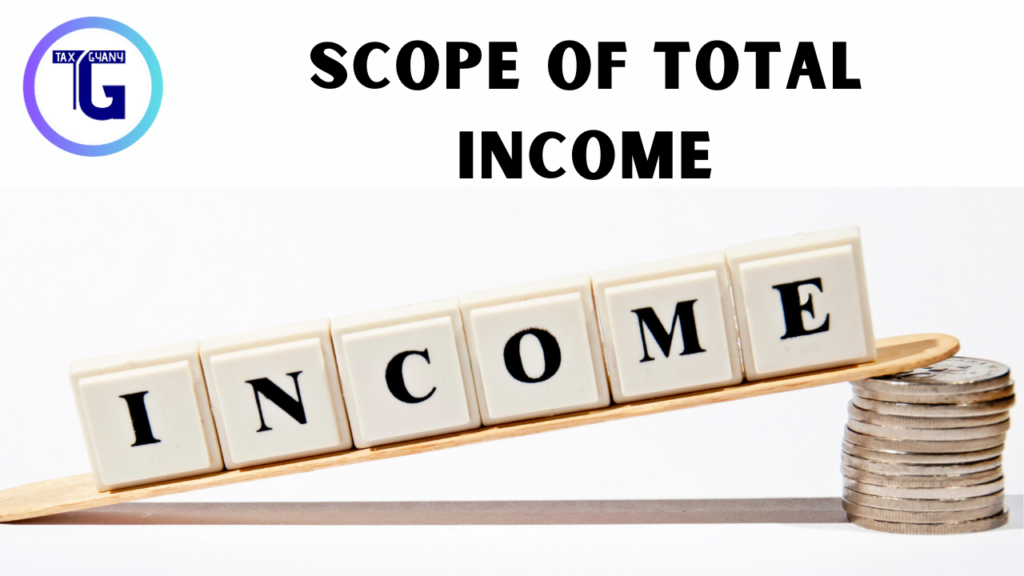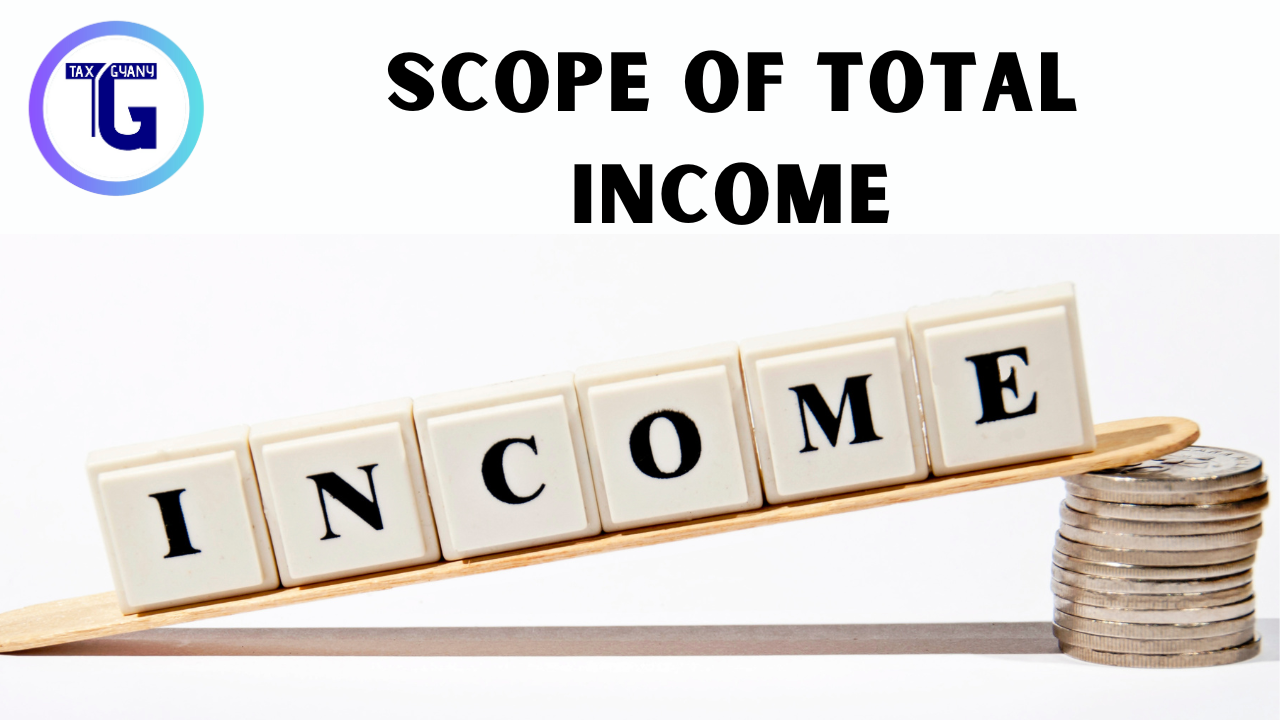Introduction:
Scope of Total Income Filing income tax returns is a significant aspect of financial management for individuals and businesses. Central to this process is understanding the scope of total income, which forms the basis for determining tax liability. In this blog post, we explore the concept of total income, its scope, and implications for taxpayers.
Scope of Total Income:
The scope of total Income encompasses all sources of income earned or received by a taxpayer during the previous year, irrespective of their nature or origin.
It includes income from various heads such as: Scope of Total Income

Salary: Scope of Total Income This encompasses income earned from employment, including basic wages, bonuses, commissions, allowances (such as travel allowance, house rent allowance), and perquisites (such as company-provided accommodation, car, or club memberships).
House Property: This refers to rental income earned from properties owned by the taxpayer. It includes the net annual value of the property after deducting municipal taxes, standard deductions (like 30% of the net annual value), and interest paid on home loans.
Business or Profession: Scope of Total Income Income derived from any trade, business, profession, or vocation carried out by the taxpayer. It includes profits or gains from commercial activities, self-employment income, consultancy fees, and earnings from freelancing.
Capital Gains: This category covers profits or gains arising from the sale of capital assets such as real estate, stocks, mutual funds, and valuable items like jewelry or art. Capital gains can be classified as short-term (assets held for less than 3 years) or long-term (assets held for more than 3 years).
Other Sources: Income from miscellaneous sources that do not fall under the above heads. This includes interest earned from savings accounts, fixed deposits, and bonds, dividends from investments in shares or mutual funds, royalties from intellectual property, winnings from lotteries or games, gifts received exceeding specified limits, and any other income not specifically covered under other heads.
Determining Total Income:
The computation of total income involves aggregating income from all sources and applying deductions, exemptions, and allowances as per the provisions of the Income-tax Act, 1961. Taxpayers are required to report their income accurately and disclose any additional sources of income to ensure compliance with tax laws.
Deductions and Exemptions:
Taxpayers are entitled to claim deductions and exemptions to reduce their total taxable income, thereby lowering their tax liability. Common deductions include investments in specified avenues such as Provident Fund, Public Provident Fund, Equity-linked Savings Scheme (ELSS), National Pension System (NPS), and payment of insurance premiums. Additionally, exemptions are available for certain incomes such as agricultural income, dividends from specified entities, and interest earned on specified savings schemes.
Importance of Compliance:
Adhering to the scope of total income and accurately reporting all sources of income is crucial for taxpayers to fulfil their tax obligations. Non-compliance can lead to penalties, interest, and legal consequences, impacting financial well-being and reputation.
Total Income and Computation of Tax Liability
| 1. Income from Salaries | |
| Income from salary | |
| Add: Taxable allowances | |
| Add: Taxable perquisites | |
| Gross Salary | |
| Less: Deductions u/s 16 | |
| – Standard deduction | |
| – Entertainment allowance | |
| – Professional tax | |
| Taxable Income under the head ‘Salaries’ | |
| 2. Income from House Property | |
| Net Annual Value | |
| Less: Deductions u/s 24 | |
| Taxable Income under the head ‘Income from House Property’ | |
| 3. Profits and Gains of Business and Profession | |
| Net profit as per Profit and Loss Account | |
| Add: Amounts debited to P & L A/c but are not allowable as deduction under the Act | |
| Add: Amounts not credited to P & L A/c but are taxable under the head PGBP | |
| Less: Amounts credited to P & L A/c but are exempt u/s 10 or are taxable under other heads of income | |
| Less: Amounts not debited to P & L A/c but are allowable as deduction under the Act | |
| Taxable Income under the head ‘Profits and Gains of Business and Profession’ | |
| 4. Capital Gains | |
| Amount of Capital gains u/s 48 | |
| Less: Exemption u/ss 54, 54B, 54D, 54EC, 54EE, 54F, 54G, 54GA, 54GB, 54H | |
| Taxable Income under the head ‘Capital gains’ | |
| 5. Income from other sources | |
| Gross income | |
| Less: Deductions u/s 57 | |
| Taxable Income under the head ‘Income from other sources’ | |
| Total [1 + 2 + 3 + 4 + 5] | |
| Less: Adjustment of set off and carry forward of losses | |
| Gross Total Income | |
| Less: Deductions under sections 80C , 80D, 80TTA to 80U [Chapter VI-A] | |
| Net Taxable Income | |
| Computation of Tax Liability: | |
| Tax on Net income | |
| Less: Rebate u/s 87A (Available if resident individual is having net taxable income of ` 5,00,000 or less) | |
| Income Tax after rebate | |
| Add: Surcharge, if applicable | |
| Tax and surcharge | |
| Add: Health and Education cess | |
| Less: Rebate u/ss 86, 89, 90, 90A and 91 | |
| Less: Prepaid taxes, if paid | |
| Self assessment tax paid (SAT) | |
| Tax Deducted or Collected at Source (TDS and TCS) | |
| Advance tax | |
| Total Net Tax liability |
Sources : https://www.incometax.gov.in/iec/foportal/
For More Information :https://taxgyany.com/

